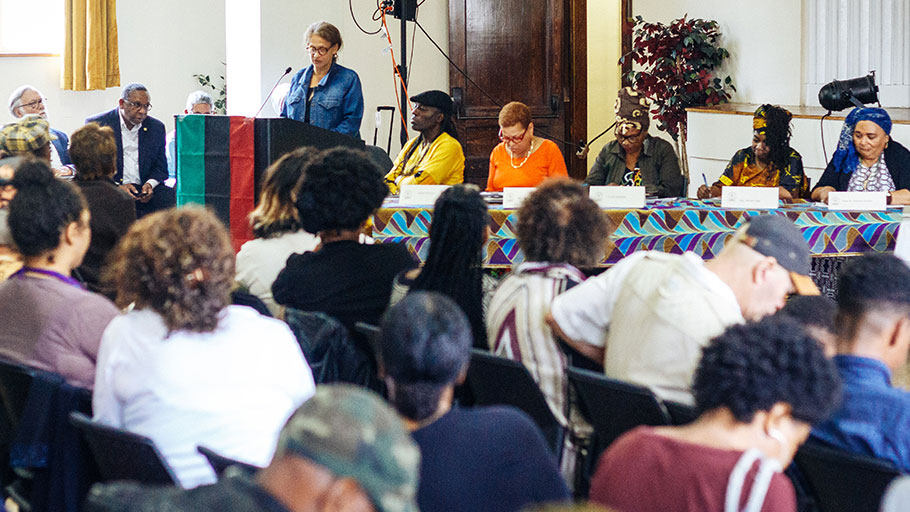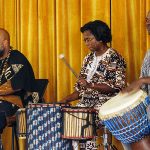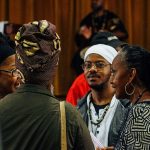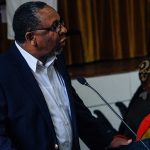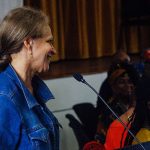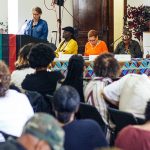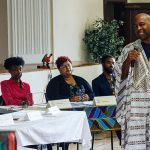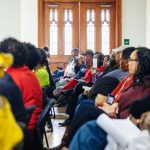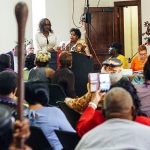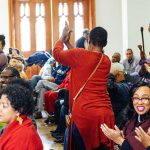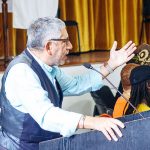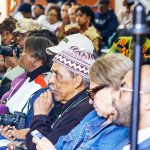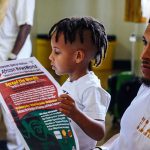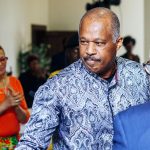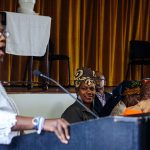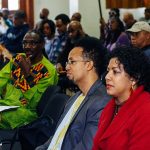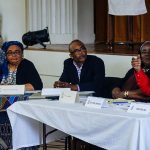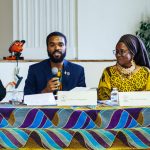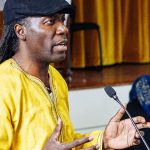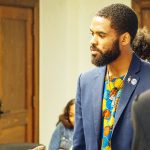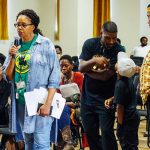On this page:
- Benefit Reception is Rousing Success
- Hearing and Town Hall Meeting Informs and Engages Area/Regional Residents
- Working Sessions Action Agenda for U.S. and Global Reparations Movements
- Synopsis of the Action Agenda
- Special Thanks & Acknowledgements
- PDF version of The New Orleans Reparations Gathering Communiqué
- Contact
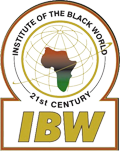
November 30 – December 2, 2017, the National African American Reparations Commission (NAARC) convened a major Reparations Gathering in New Orleans, Louisiana, USA. A primary goal of the Gathering was to continue the process of creating greater public awareness about NAARC’s Preliminary 10 Point Program for Reparations for African Americans and to receive input, suggestions, recommendations on the Program from constituents from the area/region. The Conveners were also eager to provide information on the global Reparations Movement as reflected in the initiatives of the CARICOM Reparations Commission in the Caribbean and efforts to empower Afro-Descendants in Central and South America with a focus on the crises of Afro-Descendants in Colombia, South America. In addition, the status and future of HR-40, which would create a Commission to Study Reparations Proposals for African Americans, was of particular interest in light of the retirement of Congressman John Conyers, Dean of the Congressional Black Caucus. Congressman Conyers had faithfully introduced and advocated for the bill since 1989.
Benefit Reception is Rousing Success
This milestone Gathering consisted of a Benefit Fundraising Reception featuring Danny Glover, Actor, Humanitarian and Ambassador for the U.N. Decade for People of African Descent as the Keynote Speaker, a Hearing/Town Hall Meeting where Professor Sir Hilary Beckles, Vice Chancellor/President of the University of the West Indies and Chairman of the CARICOM Reparations Commission, was the Principal Presenter and a full day Working Session to discuss plans to strengthen and advance the U.S., Caribbean and global Reparations Movements.
An overflow audience of more than 350 people packed the Southern University at New Orleans Conference Center for a spirited, informative and inspirational Benefit Fundraising Reception. The solidarity greetings/messages by Dr. Clyde Robertson, Director of the Center for African and African American Studies at the University, Mireille Fanon Mendes France, Founder and President of the Frantz Fanon Foundation, Esther Ogulari, Human Rights Activist from Colombia and Dr. Julianne Malveaux, President Emeritus of Bennett College for Women and NAARC Commissioner were greeted with rousing applause and Danny Glover’s Keynote Address was powerful and moving.
Watch Videos
More video to be released. Subscribe to IBW’s YouTube Channel or Email Newsletter for notifications.
Danny Glover
Keynote Speaker, Actor, Activist, Global Humanitarian
Michael “Quess” Moore
Poet, Educator, Actor
Hearing and Town Hall Meeting Informs and
Engages Area/Regional Residents
Photos taken Saturday, December 2, 2017 at Xavier University, New Orleans
Hosted by Dr. Cerecie Olatunji, Director for the Center for Traumatic Stress Research, approximately 250 people attended/participated in the Hearing and Town Hall Meeting at Xavier University. The Opening Ceremony included Welcome Remarks by Dr. C. Reynolds Verett, President of the University and inspirational spoken word presentations. Working from the theme, Finishing Our Pyramid, Professor Sir Hilary Beckles delivered a captivating Keynote Address tracing the persistent historical struggle for reparations from the very moment of Africans forced arrival in the western hemisphere. He challenged those assembled to continue the struggle until reparations are won!
At the beginning of the Town Hall Meeting Kamm Howard, Co-Chairperson of the National Coalition for Reparations for African Americans (NCOBRA), presented a statement on the status and future of HR-40 which was developed by a number of reparations organizations in the U.S. The statement encouraged activists, organizers, advocates and political leaders to vigorously push to achieve a maximum number of Co-Sponsors for HR-40 in the U.S. Congress as part of the legacy of Congressman Conyers. The statement also called attention to the longstanding and unacknowledged assault against women of African descent. Subsequently, a group of women Participants came together organically during the deliberations at the Working Session to demand recognition of and Reparations for the centuries of sexual assault, lynching, mutilation, forced separation of families and other unspeakable crimes committed against African women in the U.S. and globally during the holocaust/MAAFA resulting from the Trans-Atlantic Slave Trade and subsequent generations of abuse under white supremacist systems of segregation and colonialism.
A video of the women Participants stating this position and articulating these demands was produced by Yvette Modestin, Co-Founder of the Regional Council of People of African Descent in Latin America and the Caribbean and NAARC Commissioner. The video can be viewed here on the Institute of the Black World 21st Century website — www.ibw21.org
As an outgrowth of the proceedings, the Local Host Committee for the New Orleans Reparations Gathering has formed an Interim Committee to undertake reparations advocacy in the city and state, initially focusing on the Tricentenary of the founding of New Orleans to expose and hold accountable corporations/businesses, financial institutions, colleges/universities and families that benefitted from the enslavement of Africans!
Working Sessions Action Agenda for U.S. and Global Reparations Movements
The Conveners thought it important to take advantage of an extraordinary assembly of Commissioners from NAARC, the CARICOM Reparations Commission (CRC) and Reparations leaders and advocates from the U.S., France and Colombia, South America to discuss an Action Agenda. Participants at the Working Session Table included:
Danny Glover
Actor, Humanitarian and Ambassador, U.N. Decade for People of African Descent, U.S.
James Early
Consultant: Cultural Democracy and Statecraft Heritage Policy, African Disapora, U.S.
Professor Hilary Beckles
Chairman, CARICOM Reparations Commission, Jamaica
Mireille Fanon Mendes France
Frantz Fanon Foundation, France
Helmer Quinones Mendoza
Lead Analyst, Consultancy for Human Rights and Displacement (CODHES), Colombia, South America
Esther Ogulari
Human Rights Activist, Doctoral Candidate, Institute of Commonwealth Studies, University of London via Colombia, South America
Jesus Chucho Garcia
Venezuela, South America
Damani Aaquil
Regional Council of People of African Descent in Latin America and the Caribbean, U.S.
Yvette Modestin
Regional Council of People of African Descent in Latin America and the Caribbean, U.S.
Dara Cooper
Movement for Black Lives (M4BL) Policy Table, U.S.
Janetta Jones
Movement for Black Lives (M4BL) Policy Table, U.S.
Latosha Brown
U.S. Human Rights Network, U.S.
NAARC Commissioners, U.S.
Kamm Howard
National Coalition of Blacks for Reparations In America (NCOBRA)
Dr. Julianne Malveaux
President Emeritus, Bennett College for Women
Rev. JoAnn Watson
Former Detroit City Councilwoman
Dr. VP Franklin
Editor, Journal of African American History
Atty. Nkechi Taifa
Criminal Justice Reform and Reparations Activist
Yvette Modestin
Founder and Executive Director, Encuentro Diaspora and IBW Board Member
Nana Dr. Patricia Newton
President/CEO, Black Psychiatrist of America
(Participated in Hearing/Town Hall Meeting but unable to attend Working Session)
Designated NAARC Commissioners (formal appointments pending):
Judge Lionel Jean Baptiste
Founder and Chairman Emeritus of the Haitian Congress to Fortify Haiti
Dr. David Horne
Los Angeles Reparations United Front
Institute for the Black World 21st Century (IBW)
Dr. Ron Daniels
President, Institute of the Black World 21st Century (IBW) and Convener of NAARC
Don Rojas
Director of Communications
Dr. Taiwan Lovelace
Board Member
Synopsis of the Action Agenda
Clarifying Terms that Demand Remedy Repair for People of African Descent
The Group expressed some concerns about the potential for confusion over the definition and meaning of “reparations” because of the increasing use of terms like “reparatory justice” and “reparative justice.” After an informative discussion, it was agreed that the use of new terms that point to remedy for damages inflicted on African people is a very positive development, but that clarification would be useful. A cross-national Task Team comprised of Atty. Nkechi Taifa, Kamm Howard, Lionel Jean Baptiste, Yvette Modestin, Mirielle Fanon Mendes-France, Esther Ogulari and Don Rojas agreed to draft clarifying definitions for various terms for review by NAARC and the CARICOM Reparations Commission. Once a consensus on these definitions is achieved, they will be released to the public.
The Future of HR-40, the U.S. Congressional Bill to Study
Reparations Proposals for African Americans
It was agreed that HR-40 should remain a focal point of education and organizing despite the recent retirement of Congressman John Conyers. The campaign for passage of HR-40 by the U.S. Congress is also viewed a significant dimension of the global Reparations Movement. A Statement of the longstanding assault on women of African Descent was also devised and video-taped as referenced in the Hearing/Town Hall Meeting section of this document.
U.S. Colleges and Universities that Benefited from Enslavement of Africans
Dr. VP Franklin presented a series of resolutions designed to hold colleges and universities in the U.S. that benefitted from enslavement accountable for criminal behavior. He cited the awarding of free tuition to the descendants of enslaved Africans and the development of scholarship funds for Black students in general as one possible remedy. It was suggested that working on this issue is an excellent way to engage college and university students in the Reparations Movement. This same approach could well apply to colleges and universities in Europe that benefitted from the Trans-Atlantic slave trade.
Utilizing the U.N. Decade for People of African Descent to
Advance the Interests of Black People
Mireille Fanon Mendes-France, Danny Glover, Latosha Brown and other Participants expressed frustrations that the U.N. Decade is not gaining traction in terms of galvanizing action on major issues of vital concern to Black people in various nations. It is clear that top officials at the U.N. would be satisfied with a myriad of celebrations and ceremonies that do not disturb the status-quo as it relates to policy. And, there is an aversion to the Decade being used as a platform to espouse reparations. Therefore, very little funding has been allocated to educate and organize people of Africa to engage the Decade. The Group resolved that leaders and organizations should not wait on the U.N. or various governments to fund or define the Decade; that we should seize the moment and strive to define and utilize the Decade as a vehicle to address concerns or to advance substantive policies, e.g., framing reparations as a development issue and tying it to the U.N.’s Millennial Development Goals.
It was further agreed that advancing the Decade in the U.S. could be facilitated by the creation of an umbrella structure similar to the one recently developed by leaders and organizations in Europe. It was noted that the are various organizations in the U.S. promoting the decade in isolation to each other rather than collaborating, coordinating and marketing in a manner that could maximize the engagement of constituencies to effectively advance major policy proposals. This does not mean that some good work is not being done on the Decade, it simply suggests that the overall impact of the work of various organizations could be maximized by an intentional effort to collaborate and coordinate on some mutually agreed upon major policy proposals.
It was suggested that such a collaboration could begin with organizations represented at Table like the Samuel DeWitt Proctor Conference and the Human Rights Network which are already engaged in significant work on the Decade. Connecting these organizations is the first priority in a process of exploring the feasibility of creating a united front formation to promote the Decade. Organizations at the Table would connect with and support such a formation as the primary vehicle for promoting a major policy agenda via the Decade. Participants were clear that this formation would in no way interfere with or discourage work on the Decade by non-associated organizations or leaders. Many flowers blossoming around the Decade is viewed as positive. The sole purpose of the united front formations is to have an entity committed to advancing a major policy agenda.
Dr. Ron Daniels was asked to facilitate the connection and discussions between the Samuel DeWitt Proctor Conference and the Human Rights Network to begin the process. Dr. Iva Carruthers, General Secretary of the Samuel DeWitt Proctor Conference, who was unable to attend the New Orleans Reparations Gathering, has already responded affirmatively in terms of the need and willingness to discuss collaborative approaches to advance the Decade. Latosha Brown was at the Table representing the Human Rights Network and was agreeable to the proposal.
Professor Sir Hilary Beckles Recommends Global Reparations Initiatives
Professor Sir Hilary Beckles, Chairman of the CARICOM Reparations Commission and a leading voice for the Reparations Movement globally, offered a series of ideas for the Group’s consideration. The following are among the most important of his recommendations:
- There is a need to establish a “think tank” in the U.S. to do the kind of scholarly research being conducted at the recently launched Center for Reparations Research at the University of the West Indies Mona Campus in Jamaica. The research of the Center will bolster the work of the CARICOM Reparations Commission.
- It is important to frame the global reparations narrative within the context of the urgent need for a post-independence “Marshall Plan” for development in the Caribbean. A similar argument might also apply to the U.S.
- There is critical need to more fully engage African nations and civil society in the Global Reparations Movement. Accordingly, a number of African Heads of State and civil society leaders have been consulted about convening a Global Reparations Conference in Africa in 2018. Benin, Niger, Nigeria and Ghana are among the nations that might host the proposed conference.
- There is a need to engage highly respected leaders like former Jamaican Prime Minister J. Paterson as global emissaries that can engage in ongoing dialogue with African Heads of State, Leaders of CARICOM and Members of the Congressional Black Caucus to consolidate and expand high level support for the Global Reparations Movement.
The Crises of Afro-Colombians
The Quest for Reparations and the Empowerment of Afro-Descendants in the Region
Helmer Quiones Mendoza and Esther Ogulari presented a grim picture of the ongoing assault against Afro-Colombian communities in the relentless effort to dislodge them from their resource-rich ancestral lands. These horrific assaults include threats/intimidation, abuse and rape of women and the targeting and assassination of leaders of the resistance movement. They made an urgent appeal for leaders and organizations to demand that the Government of Colombia protect the rights of Afro-Colombians. Corporations engaged in the effort to displace Afro-Colombians should be identified and targeted for economic sanctions. And, Political leaders, including those associated with FARC should be urged to respect the rights of Afro-Colombians to live with peace and security on their lands.
Esther and Helmer also reported that as an outcome of the Reparations Conference convened in Colombia last year, there is interest in forming a National Reparations Commission which would develop a Reparations Program similar to those devised by the CARICOM Commission and NAARC. They requested continued consultation and support from the CARICOM Commission and NAARC as organizations and constituencies in Colombia explore this possibility.
There was overwhelming consensus at the Table to identify ways of supporting these requests coming from the Participants from Colombia.
Yvette Modestin and Damani Aaquil, representing the Regional Council of People of African Descent in Latin America and the Caribbean, responded with recommendations on the crises in Colombia and engaged the Group in a multifaceted discussion on the issue of recognizing and empowering Afro-Descendants in Central and South America. The following is a synopsis of the recommendations presented to the Group:
- NAARC should take a strong public position condemning the plague of assassinations, human rights abuses and racist violence against the Afro-Colombian community.
- NAARC should send observers to monitor the implementation of the peace process in Colombia.
- NAARC should bring together a broad coalition of African-American forces to build solidarity with the struggles of our Afro-Colombian sisters and brothers.
- NAARC and the CARICOM Reparations Commission (CRC) should continue to provide support and encouragement for the establishment of Reparations Commissions in Colombia and other Latin American countries.
- Based on commonalties of history and culture, communities within the African diaspora should create stronger networks to facilitate regular communications, mutual support and collective action to promote and protect the interests of Afro-Descendants.
- NAARC should closely coordinate its Latin American outreach with the Regional Council of Africans in the Americas via its Co-Founders Jesus ‘Chucho’ Garcia, Damani Aaquil and Yvette Modestin.
- The Political Platform of the Red de Mujeres Afro (U.N. Women’s Working Group) will be used as a tool to address specific issues in the Region that coincide with the Decade of People of African descent.
Engaging and Collaborating with the Movement for Black Lives
NAARC extended and invitation to the Movement for Black Lives (M4BLs) to participate in the New Orleans Reparations Gathering to continue the process of building cross-generational engagement and collaboration initiated during a similar Gathering in Atlanta in 2015. Continuing this process is a major priority of NAARC. Dara Cooper and Janetta Johnson participated in the New Orleans Gathering representing the M4BL’s Policy Table, the largest of several Tables in the coalition of over 50 autonomous Black-led organizations. They were fully engaged in all aspects of the Gathering, including contributing substantive suggestions during the Working Session. Dara and Janetta informed the Group that reparations is one of the 5 broad areas of work reflected in the M4BL Policy Platform released to the public 18 months ago. They reiterated M4BL’s support for the revised HR-40 – which representatives of the organization helped to formulate and pledged to report on the proceedings of the Gathering to the Policy Table.
Dr. Daniels, Convener of NAARC, called for continued cross-generational engagement on reparations with M4BLs moving forward.
The Participants in the Working Session encouraged the Conveners to circulate a summation of the milestone New Orleans Reparations Gathering, including the Action Agenda via Communique to Reparations activists, scholars, organizations, civil rights/human rights organizations and the Congressional Black Caucus in the U.S., the CARICOM Secretariat, CARICOM Reparations Commission, emerging Commissions in Colombia, Latin America and European, U.N. Civil Society Working Groups, appropriate U.N. Officials, the African Union, civil society and sympathetic Heads of State in Africa.
Special Thanks & Acknowledgments
New Orleans Core Host Committee
Cirecie Olatunji, VP Franklin, Larry Hayes, Nana Anoa Nantambu, Anika Ofori, Mtumishi St. Julien, Karran Royal, Meghan Berger, Alexis McKinney, Van Perkins, Kamili Nilata, Alvin Smith
#ReparationsNow Donors
Ukali Mwendo for the Provisional Government of the Republic of New Africa, Dr. and Mrs. Keith C. Ferdinand, Adjowa and Mwalimu Shujaa, Mtumishi & Shawishi St. Julien, Larry Hayes, Nilima Mwendo, Kamili Nilata, Alvin Smith, Gloria Green, Baakir Tyehimba, Nicole Tyehimba, Deborah Lowe, Jacques Morial. And the many others — We thank you!
Media Friends
Vincent Sylvain, Harold Clark, Chuck Perkins, W.C. Johnson
Our Team, Media Partner and Sponsors






Download/Print PDF
PDF version of this communiqué available by clicking here


